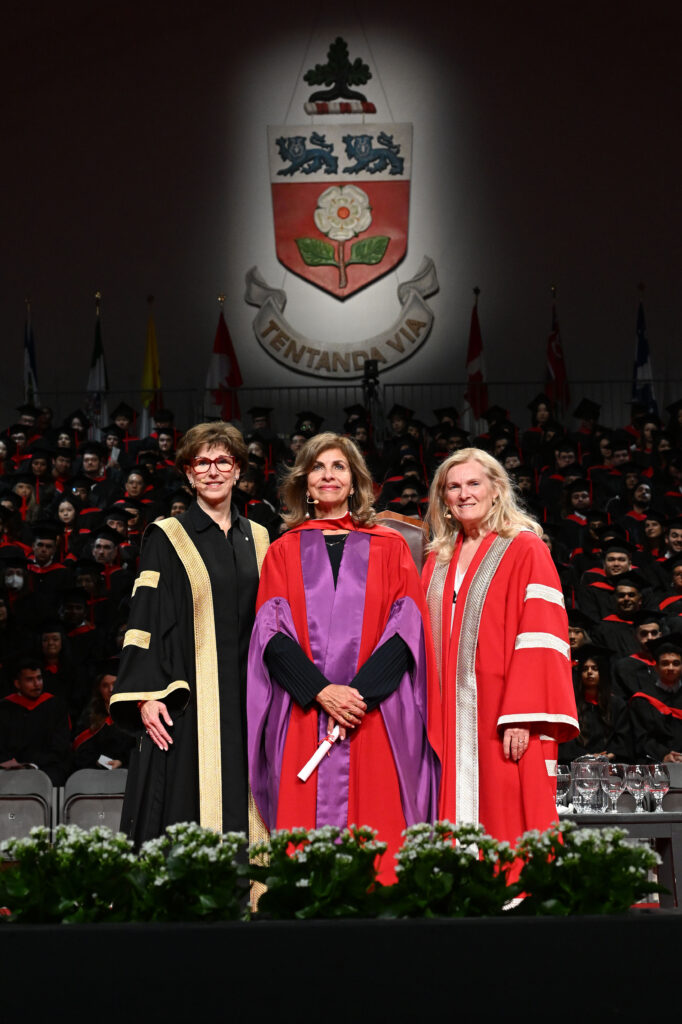
[tta_listen_btn listen_text="Click to listen to this story" pause_text="Pause" resume_text="Resume" replay_text="Replay" start_text="Start" stop_text="Stop"]
After receiving her honorary degree at an Oct. 13 Fall Convocation ceremony for graduands from York University's Osgoode Hall Law School, Andromache Karakatsanis (LLB ’80), herself an Osgoode alumna as well as Canada’s longest-serving Supreme Court justice, shared her inspirational story and words of wisdom with the crowd.

Born and raised in Toronto, Justice Karakatsanis is the child of Greek immigrants, whom she credits for her dedication and work ethic.
After receiving a bachelor of arts in English literature from the University of Toronto, Karakatsanis went on to earn her bachelor of laws from Osgoode. There, she met her husband and had the opportunity to work at Parkdale Community Legal Services, which she reflects on fondly as one of the most satisfying experiences of her legal education.
"As a graduate of Osgoode Hall Law School, this is a special homecoming," Karakatsanis said in her opening remarks. "I feel that life has come full circle, returning to York University for Convocation after a journey of decades that have been enriched by the education, the skill and the values I learned here on this campus."
Called to the Ontario bar in 1982, Karakatsanis began her legal career practising criminal, civil and family law before shifting her focus to the public service in 1987. As the first woman to lead the Liquor Licence Board of Ontario, she served as Chair and chief executive officer until 1995, followed by a stint as assistant deputy attorney general of Ontario and secretary for Native Affairs. Karakatsanis then served as the province's secretary of the cabinet and clerk of the executive council beginning in 2000, before becoming a judge of the Ontario Superior Court of Justice in 2010 and being appointed to the Supreme Court of Canada only one year later.
"Put simply, Justice Karakatsanis is everywhere when it comes to Canada's justice landscape," said Osgoode Dean Trevor Farrow after his glowing introduction. "In 2002, the Law Society of Ontario presented Justice Karakatsanis with an honorary LLD in recognition of her long-standing and tireless service to justice in Canada. So, while we may not be the first to present her with an honorary degree, I think we are certainly the most proud."
Karakatsanis began her speech by reflecting on her 97-year-old mother's story of hardship and sacrifice, spending her youth in a war-ravaged country. After losing her father, she bravely left for Canada alone with nothing but hope for a better future. Following her arrival, she met her future husband – another young, Greek immigrant – and together they opened a restaurant and raised three children with lives full of all the opportunity they didn't have.
"In another time and place, this woman would have risen to the top of any profession she wanted," said Karakatsanis of her mother, who sat proudly in the Convocation audience. "But it was because of her sacrifice and her example that decades later she would watch her daughter sworn in as a justice of the Supreme Court of Canada."
Karakatsanis acknowledged that there are very few countries in the world where the first-generation child of immigrants can become a judge of the country's highest court, and praised Canada as a "generous and pluralist model for the world."
"We may not look, speak or pray alike," she said, "but for the most part we have learned to live together in harmony."
She then turned her attention to the injustices that are ever-present, and the responsibility that comes with embarking on a legal career.
"We live in a world where vulnerable people must fight to have their humanity recognized, where fear and prejudice often triumph over compassion and kindness, and where justice sometimes is an elusive goal rather than a secured outcome," said Karakatsanis.
The law, she continued, has undoubtedly played a role in the many historical failures of humanity. "The Holocaust was legal under German law, as was the Jim Crow system in the United States, apartheid in South Africa and the Chinese Head Tax here in Canada," she said. "They are not relics of the distant past, nor are they inconceivable in the present."
She emphasized that the lessons of the past should serve as reminders not to take the future for granted: "The values and freedoms and opportunities we hold so dear were fought for with sacrifice and bravery. And just as they were won, they can be lost."
In her final words to Osgoode's graduating class, Karakatsanis encouraged graduands beginning their own journeys in the legal profession to seek out opportunities to make a difference.
"As we celebrate our personal triumphs, and honour the people and places that have made them possible, today is also a moment to reflect on what you can do to shape the future, to protect democracy, to build equality, to achieve reconciliation," said Karakatsanis. "Don't forget that the values by which you choose to live your life are just as important as any job you will undertake. Those values are how we will ensure that generations to come can stand where we stand today."
